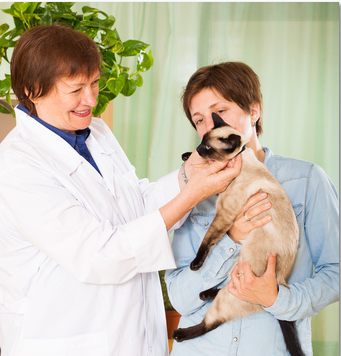Timely communication and trust are the keys to successful relationships.
Few situations in daily practice have greater potential for a win-win reward than when a primary care veterinarian refers a pet with a complicated medical condition to a veterinary specialist.
- The referring doctor knows she’s giving her patient the best care in a difficult medical crisis.
- The pet parent recognizes wisdom, knowledge, and compassion in her primary care doctor.
- The patient is given a greater chance to recover and live a longer, better life.
Veterinary Medicine is a Complex Profession
 Every veterinarian in general practice functions daily within a unique triad of doctor, patient, and client. Even simple tasks like administering routine vaccinations involve decisions based on a combination of current research and the needs of individual patients.
Every veterinarian in general practice functions daily within a unique triad of doctor, patient, and client. Even simple tasks like administering routine vaccinations involve decisions based on a combination of current research and the needs of individual patients.
Those general practice veterinarians frequently encounter patients with injuries or illnesses requiring care beyond their expertise, diagnostic equipment, or experience.
No one person can have all the answers, which for many practitioners stimulates a level of stress.
Only a few years ago, there were not many options in those situations. Those who practiced during such times understand on a deep level the value of access to referral hospitals, which often replace stress with confidence.
Still, it’s helpful to recognize the increased complexity created by referral of a patient to a specialty hospital. Now we have an added relationship: referral doctor, patient, client, and primary care doctor.
Cooperation and understanding between the primary care and referral doctors create a rewarding relationship. Those rewards flourish when there is mutual respect between the doctors.
Communication is Paramount…
Paramount to Relationships
Ask the primary care veterinarian or the owner of a referral service, “What’s the most important ingredient in providing excellent care?” They’ll tell you without having to think: “It’s communication.”
Paramount to Ethical Conduct
Of course, the AVMA outlines basic responsibilities in its Principles of Veterinary Medical Ethics document. But those are only basic guidelines.
Paramount to Patient Care
The potential benefits to the two veterinary practices, the patient, the clients, and the profession are too great to be satisfied with minimal actions. Communication must be timely and clear.
It seems there are new ways to communicate digitally popping up everyday. There may be times when a text message, for instance, is helpful with short bits of information. But, in order to convey information as well as concern for the patient, direct conversations by phone still provide the best opportunity to avoid miscommunication.
Trust is the Bonding Agent
Just as good client-doctor relationships are built on trust, there must be a strong level of trust between specialists and primary care doctors.
There will always be times when the potential for conflict arises. For instance, there are times when the referral doctor realizes the correct diagnosis is different from the reason for the referral. In such cases, the specialist must tactfully explain the situation to the client while preserving the integrity of the primary care doctor. Unless, of course, there is negligence involved, these are ideal opportunities to enhance trust between doctors.
From the other point of view, if a client complains to their primary care doctor about some aspect of care at a referral hospital, a strong level of trust will enable her to clear up a misunderstanding on the part of the client and defend the integrity of the specialist.
Conclusion
-
Poor Communication is Enemy # 1
Breakdowns in communication between doctors and clients often become seeds of diminished relationships. Therefore, timely conversations should be a priority in caring for patients under the care of the veterinary specialist.
-
Potential Rewards are Priceless
~The patient is healthy again.
~The client gets more time with their pet.
~Both practices experience the gratification of a job well done.
~The image of veterinary medicine is enhanced in the minds of the public.

If you have any questions about Veterinary Specialist positions, please feel free to contact me on my cell at 804.833.0585 or via email at laura@vetcareerservices.com for further details. All communication is CONFIDENTIAL.




Leave a Reply